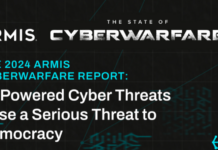Nearly 47% of IT decision makers in Singapore believe the use of AI to combat cyber threats is one of the most beneficial ways to protect their organisation from cyber attacks, according to KnowBe4.
New research from security platform show that IT decision makers see advanced threat detection, automated response mechanisms, and predictive analytics as key tools to proactively defend against evolving cyber threats.
In the latest research from KnowBe4, conducted on January 4-9 by YouGov, 202 Singaporean IT decision makers were asked to rank a list of common security practices in order of how beneficial they are to protecting their organisation.
The most popular choice was implementing firewalls and intrusion detection systems, ranked in first place by 62% of respondents, followed closely by multi-factor authentication (58%) and regular cyber security awareness training (57%) for employees.
More than half ranked encryption of sensitive data (55%) and sharing of best practices and information on data breaches between organisations businesses law enforcement and the government (51%) within their top five methods for protecting organisations.
While half (50%) of respondents ranked regular software patching and updates, the increasing impact of artificial intelligence is apparent, with over two in five (47%) expressing confidence in leveraging AI to counteract cyber threats.
“Singapore is known to have one of the highest AI adoption rates amongst markets globally so it’s no surprise that organisations are embracing AI to fortify their cyber security posture,” said David Bochsler, VP of sales in the Asia-Pacific region at KnowBe4.
Bochsler said that while IT decision makers are leveraging AI as a powerful ally in bolstering cyber defences this technology isn’t foolproof.
“The human element remains crucial in the defence against cyber attacks and best practices requires a blend of cyber security solutions available, alongside a robust cyber security awareness training program for employees,” he added.
When asked specifically about sharing information and best practices about data breaches between organisations, businesses, law enforcement and the government, close to all (96%) respondents said they believe it would benefit their organisation.
When asked how it could benefit their organisation, two in five think it would help in aiding in early detection of potential threats and vulnerabilities (43%), providing benchmarks for industry cybersecurity standards and practices (42%), and equally, more than a third believe minimising the financial impact of potential data breaches.
Over a third say enhancing incident response capabilities and reducing response time (41%) as well as facilitating the sharing of knowledge and lessons learned from others’ experiences (41%), facilitating collaboration with government agencies and law enforcement (40%), and contributing to better risk mitigation strategies and practices (39%) would be beneficial.
Further, a third of Singaporean IT decision makers say assisting in meeting compliance requirements more effectively (34%), fostering collaborative defence strategies with other organisations (33%), or allowing access to anonymised incident data for analysis without revealing specific organisational details (27%) would also benefit their organisation.
















